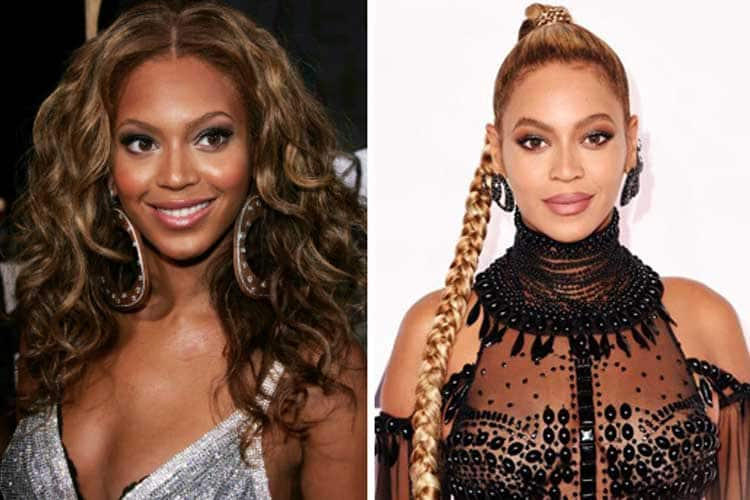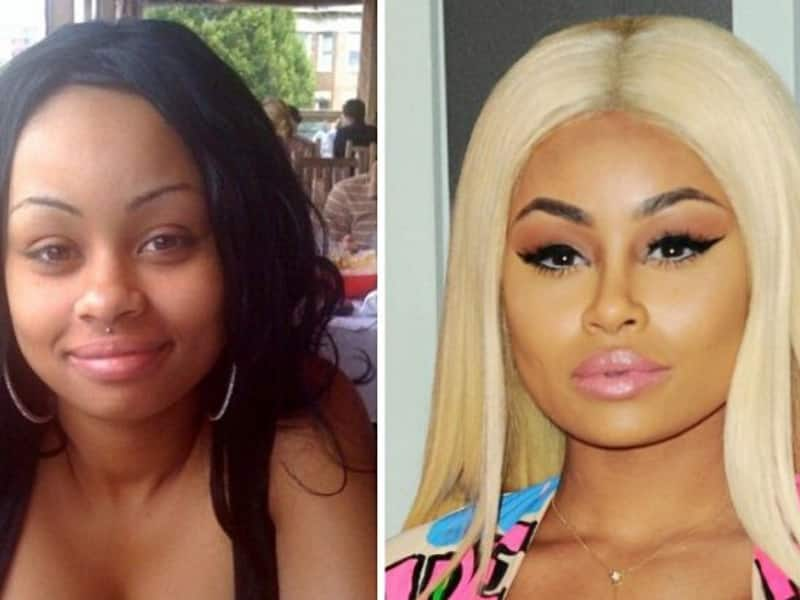Is the pursuit of a lighter complexion a path to acceptance, or a surrender to societal pressures? The trend of skin lightening among celebrities, particularly within the Black community, sparks a complex conversation about beauty standards, self-perception, and the lasting impact of colorism.
The entertainment industry, a realm often defined by its pursuit of flawless aesthetics, has long been a stage for transformations, both subtle and dramatic. When we examine the lives of those who grace the silver screen, command the stage, or dominate the airwaves, we often find a parallel narrative of appearance. From surgical enhancements to carefully curated makeup, the pressure to conform to a particular standard of beauty can be immense. It is against this backdrop that the topic of skin lightening emerges, prompting a closer examination of its motivations and consequences. The notion of altering one's skin tone, whether through creams, laser treatments, or other methods, is not new, but the context within which it is considered, especially for Black celebrities, is unique. This involves the intersection of race, beauty ideals, and professional success.
Let's delve into the lives of some individuals who have been at the center of these discussions, noting the changes in their appearance and the subsequent conversations around those changes.
| Subject | Information |
|---|---|
| Name | Lil' Kim |
| Born | July 16, 1974 (age 49 years), Brooklyn, New York, USA |
| Occupation | Rapper, actress, model |
| Known for | Her impact on hip-hop with her explicit lyrics and unique fashion sense. |
| Appearance Changes | Over the years, Lil' Kim's appearance has visibly changed, with many observing shifts in her skin tone. These changes have been documented and discussed extensively in the media. |
| Public Reaction | The alterations to Lil' Kim's appearance have been met with a range of reactions, from concern to criticism. Conversations often revolve around the pressures of the industry and the impact of beauty standards. |
| Professional Achievements | Lil' Kim has received multiple awards, including BET Awards and MTV Video Music Awards, cementing her status as a hip-hop icon. |
| Social Media Presence | Maintains a strong social media presence, where she shares insights into her life and career. |
| Reference Link | IMDB - Lil' Kim |
The transformation of Lil' Kim, especially when viewed at the 2022 BET Awards, has ignited significant debate. Photographs from the event highlighted changes in her skin tone, sparking conversations about the forces that shape beauty standards and the choices individuals make in response. It is crucial to understand the larger context, which includes the legacy of colorism and the challenges faced by Black women in the entertainment world. These discussions have the potential to reveal the societal pressures that can affect an individual's sense of self and the pursuit of beauty, which can lead some people to consider cosmetic procedures to fit into the industry.
Keri Hilson, known for hits like "Turning Me On" and "Knock You Down," also found herself at the center of speculation. The rumor mill started with public appearances showcasing a notably lighter complexion. In such instances, the media and social platforms became avenues for conjecture. What is key here is to consider the ways in which beauty standards can create a space for scrutiny, especially when celebrities are the subjects. The subsequent conversations often highlight the complexity of self-image, public perception, and the media's role in shaping these narratives.
The history of skin lightening is woven with a complex mix of cultural and societal factors. In several communities, lighter skin tones have been idealized, leading to practices aimed at achieving this look. It is worth noting that these practices are not limited to one demographic, and the reasons behind them can be traced back to colorism discrimination or prejudice based on skin color and the influence of global beauty standards. Experts suggest that racism can play a significant role in this trend, where the perceived value and attractiveness of a person may be affected by their skin tone.
- Martin Bayfield From Rugby Legend To Acting Broadcasting
- Unveiling The Story Of Jennifer Adamson Facts Tragedy
Trina, a prominent figure in the rap scene, also experienced the glare of this scrutiny. The discourse surrounding her appearance reflects a recurring theme: the pressure to conform to certain ideals. In the case of Trina, as with others, the "before and after" photos become pivotal, fueling further discussions on the motivations behind such transformations and their possible impact. The conversation around Trina also connects with the wider narrative around the entertainment industry, the emphasis on image, and the possible role of beauty expectations in career advancement. The rise to fame that Trina experienced, including her featuring on Trick Daddy's hit song "Nann Nigga," coincided with shifts in beauty standards that prompted a broader conversation on self-perception.
The implications of skin lightening extend beyond mere appearance. The use of harsh bleaches and treatments can lead to health issues, which include dark spots and acne. These medical problems are also connected with the psychological impact of these choices. This interplay between physical health and self-esteem underscores the need for a complete understanding of the phenomenon, taking into account its broader implications. The industry's involvement, whether through endorsements or the promotion of particular ideals, contributes to this complex ecosystem, which can influence public opinion.
| Subject | Information |
|---|---|
| Name | Khanyi Mbau |
| Born | October 15, 1985 (age 38 years), Soweto, South Africa |
| Occupation | Actress, television personality, businesswoman |
| Known for | Her roles in South African soap operas and her public persona. |
| Appearance Changes | Khanyi Mbau has undergone a notable transformation, significantly lightening her skin tone. |
| Public Reaction | Her change in appearance has been the subject of much discussion, with varied opinions. |
| Public Statement | When questioned about skin bleaching, Mbau has stated her fascination with healthy skin and aesthetics, attributing her brighter complexion to a five-year skin journey. |
| Professional Achievements | Has a successful career in South African entertainment and is known for her business ventures. |
| Social Media Presence | Active on social media, sharing her life and experiences. |
| Reference Link | IMDB - Khanyi Mbau |
The response of Khanyi Mbau, when confronted with the skin bleaching allegations, provides a different perspective. She emphasizes her interest in skin health and aesthetics, portraying her lighter skin as the result of a long-term commitment to skincare. This point adds another layer to the discussion, which includes the notion that skin lightening is not always related to conforming to a specific beauty standard, but may also be a personal journey. This narrative emphasizes the need to differentiate individual choices, motivations, and the broader societal influences.
When we consider the larger landscape, skin lightening is not merely a personal decision. It is also about celebrities as role models, their duty to their communities, and the responsibilities they hold. The constant scrutiny faced by stars, especially when it comes to their physical appearance, underscores the power of social expectations. The pressure to project perfection can be overwhelming, which can result in individuals turning to treatments and surgery. In this framework, the question is not only about the individual choices of celebrities, but also about the industry that encourages such decisions.
The case of Sosa, once known for his darker complexion, is another example. The noticeable lightening of his skin has been linked with a variety of explanations, ranging from skin rejuvenation to the practice of skin bleaching. This highlights the ambiguity surrounding these procedures, with celebrities often attributing these transformations to different factors. While some will acknowledge their usage of cosmetic procedures or treatments, others attribute changes to lighting, makeup, or other factors. This creates a complicated mix of perceptions and assumptions, as the public attempts to assess the underlying reasons for these transformations.
Skin lightening is not an isolated phenomenon; it is an issue that occurs in many communities. Colorism, with its roots in racism, has permeated different cultures, influencing perceptions of beauty and acceptance. It is evident in the responses from Latin communities, where the demand for lighter skin tones is often very high. The impact of skin lightening transcends geography, reflecting the widespread implications of global beauty standards. By encouraging dialogue across diverse demographics, this issue can shed light on the need for a more inclusive and accepting society.
The conversation around skin lightening is multifaceted, involving not only personal choices but also societal forces. The media's portrayal of beauty, the pressures faced by celebrities, and the historical context of colorism all contribute to this complex phenomenon. In the pursuit of this subject, it is important to approach it with compassion, understanding, and an awareness of the pressures placed on individuals in the public eye. It is only through open and honest dialogue that we can begin to address the underlying issues and promote a more inclusive society that values diversity and celebrates individuality.
The influence of skin lightening products and laser treatments must also be considered. From celebrity endorsements to direct advertising, the business of skin lightening has a widespread reach. This requires a careful look into the marketing tactics, the promises made, and the long-term consequences of these practices. The call to "call out those who advertise" highlights the need for scrutiny and increased accountability within the beauty industry, encouraging the audience to be aware and demand transparency.
In Jamaica, lighter skin tones are often regarded as more beautiful, a reality that highlights the deep-seated effect of colorism and its role in shaping perceptions. This cultural context shows the necessity of addressing these issues on a global level, where regional and historical factors significantly influence beauty ideals. This shows the intricate nature of the skin lightening issue and the different perspectives and experiences it involves.
The influence of the entertainment industry and its role in shaping beauty standards is undeniable. Celebrities frequently act as role models, and their choices can significantly influence public opinion, particularly among younger individuals. Therefore, there is an obligation for these celebrities to be aware of the implications of their decisions, particularly in relation to skin lightening. This involves a careful consideration of the message being sent and its impact on the community. The ability of celebrities to promote self-love, diversity, and the acceptance of all skin tones is a crucial factor in confronting the challenges and effects of colorism.
The discussion on skin lightening is a critical area in the larger discourse on beauty, identity, and social justice. By studying the experiences of celebrities and the societal forces that influence their decisions, it is possible to gain a deeper understanding of the complex challenges and the road to a more inclusive and accepting society. This also includes open dialogue, critical thinking, and a dedication to promoting diversity and celebrating the distinct beauty of all people.
- Explore Tinymodelthuy Tiktok Onlyfans More
- Christopher Lloyds Wives Lisa Loiacono Marriages Age Difference More


